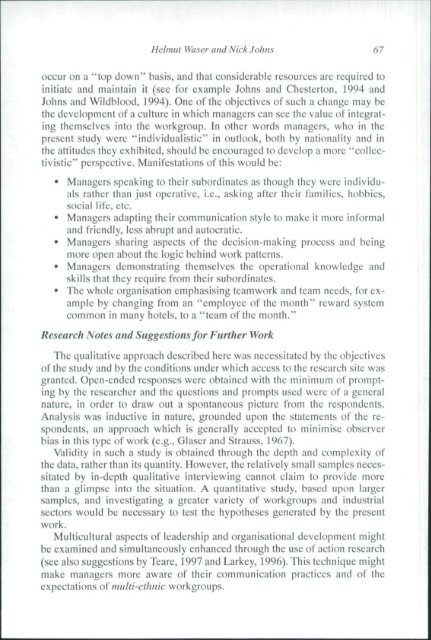global alliances in tourism and hospitality management 0789008181
global alliances in tourism and hospitality management 0789008181
global alliances in tourism and hospitality management 0789008181
Create successful ePaper yourself
Turn your PDF publications into a flip-book with our unique Google optimized e-Paper software.
Helmut Waser <strong>and</strong> Nick Johns 67<br />
occur on n "top down" basis, <strong>and</strong> that considerable resources are required to<br />
<strong>in</strong>itiate <strong>and</strong> ma<strong>in</strong>ta<strong>in</strong> it (see for example Johns <strong>and</strong> Chesterton, 1994 <strong>and</strong><br />
Jtihns <strong>and</strong> Wildblood, 1994). One ofthe objectives of such a change may be<br />
the development ofa culture <strong>in</strong> which managers can see the value of <strong>in</strong>tegrat<strong>in</strong>g<br />
themselves <strong>in</strong>to the workgroup. In other words managers, who <strong>in</strong> the<br />
present study were "<strong>in</strong>dividualistic" <strong>in</strong> outlook, both by nationality <strong>and</strong> <strong>in</strong><br />
the attitudes they exhibited, should be encouraged to develop a more "coltectivistic"<br />
perspective. Manifestations of this would be;<br />
• Managers speak<strong>in</strong>g to their subord<strong>in</strong>ates as though they were <strong>in</strong>dividuals<br />
rather than just operative, i.e., ask<strong>in</strong>g after their families, hobbies,<br />
soeiai life, etc.<br />
• Managers adapt<strong>in</strong>g their communication style to make it more <strong>in</strong>formal<br />
<strong>and</strong> friendly, less abrupt <strong>and</strong> autocratic.<br />
• Managers shar<strong>in</strong>g aspects of the decision-mak<strong>in</strong>g process <strong>and</strong> be<strong>in</strong>g<br />
more open about the logic beh<strong>in</strong>d work patterns.<br />
• Managers demonstrat<strong>in</strong>g themselves the operational knowledge <strong>and</strong><br />
skills that they require from their subord<strong>in</strong>ates.<br />
• The whole organisation emphasis<strong>in</strong>g teamwork <strong>and</strong> team needs, for example<br />
by chang<strong>in</strong>g from an "employee ofthe month" reward system<br />
common <strong>in</strong> many hotels, to a "team ofthe month."<br />
Research Notes <strong>and</strong> Suggestions for Further Work<br />
The qualitative approach described here was necessitated by the objectives<br />
ofthe study <strong>and</strong> by the conditions under which access to the research site was<br />
granted. Open-ended responses were obta<strong>in</strong>ed with the m<strong>in</strong>imum of prompt<strong>in</strong>g<br />
by the researcher <strong>and</strong> the questions <strong>and</strong> prompts used were of a general<br />
nature, <strong>in</strong> order to draw out a spontaneous picture from the respondents.<br />
Analysis was <strong>in</strong>ductive <strong>in</strong> nature, grounded upon the statements of the respondents,<br />
an approach which is generally accepted to m<strong>in</strong>imise observer<br />
bias <strong>in</strong> this type of work (e.g.., Glaser <strong>and</strong> Strauss. 1967).<br />
Validity <strong>in</strong> such a study is obta<strong>in</strong>ed through the depth <strong>and</strong> complexity of<br />
the data, rather than its quantity. However, the relatively small samples necessitated<br />
by <strong>in</strong>-depth qualitative <strong>in</strong>terview<strong>in</strong>g cannot claim to provide more<br />
than a glimpse <strong>in</strong>to the situation. A quantitative study, based upon larger<br />
samples, <strong>and</strong> <strong>in</strong>vestigat<strong>in</strong>g a greater variety of workgroups <strong>and</strong> <strong>in</strong>dustrial<br />
sectors would be necessary to test the hypotheses generated by the present<br />
work.<br />
Multicultural aspects of leadership <strong>and</strong> organisational development might<br />
be exam<strong>in</strong>ed <strong>and</strong> simultaneously enhanced through the use of action research<br />
(see also suggestions by Teare, 1997 <strong>and</strong> Larkey, 1996). This technique might<br />
make managers more aware of their communication practices <strong>and</strong> of the<br />
expectations oi mtdti-etlmlc workgroups.





